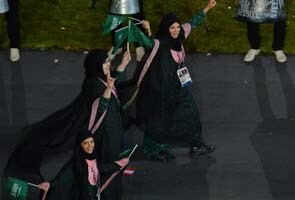
Riyadh:
Saudi commentators on Saturday hailed the first ever participation of women from the ultra-conservative kingdom in the Olympics, but criticised placing female athletes behind the men in the opening ceremony.
"The kingdom is shining with its sons and daughters in London," wrote columnist Jamal Khashoggi on his Twitter page.
"Finally, the Saudi team has men and women," wrote female journalist Haifa al-Zahrani on her page.
Saudi Arabia, which applies a strict version of Islamic sharia law and imposes constraints on women, agreed to send women athletes to the Olympics on condition that they respect a strict dress code.
During Friday night's opening ceremony at the Olympic stadium in London, the two women, judoka Wojdan Shaherkani and US-raised 800m runner Sarah Attar, walked behind their male colleagues in the Saudi team.
"Saudi women came behind, while other delegations had women in the front, with some even carrying the flag," lamented rights activist Manal al-Sharif.
Mr Sharif has become a symbol of Saudi women's struggle to be allowed to drive after being arrested last year for getting behind the wheel.
"Saudi Arabia will remain in the back seat as long as its women are in the back seat," she wrote.
Not everyone in Saudi Arabia greeted the move as a step forward.
People who opposed female participation in the Games started a Twitter hashtag saying "Stop women participation in the Olympics," while others went even further with the hashtag "The prostitutes of the Olympics."
Saturday's Saudi newspapers did not report the landmark participation of women in the Olympics amid poor coverage of the opening ceremony, possibly due to the time difference with Britain.
Princess Bassma bint Saud bin Abdul Aziz cheered the Saudi team, but also wondered: "I don't understand how men walked in before women!"
Some Tweeters posted a picture of Attar wearing the traditional black abaya cloak and brandishing a Saudi flag during the parade.
The country's most senior sports official, Prince Nawaf bin Faisal, had said that women would be allowed to compete so long as they were "wearing suitable clothing that complies with sharia."
He also added other stipulations, including that "the athlete's guardian agrees and attends with her," and that "there must also be no mixing with men during the Games."
However, men and women share the judo training venue, the warm-up area in the competition arena and also fight side-by-side on the various mat areas.
On Thursday, the International Judo Federation banned Shaherkani from wearing the Islamic hijab headscarf during her bouts, triggering a complaint from the Saudi delegation.
"The kingdom is shining with its sons and daughters in London," wrote columnist Jamal Khashoggi on his Twitter page.
"Finally, the Saudi team has men and women," wrote female journalist Haifa al-Zahrani on her page.
Saudi Arabia, which applies a strict version of Islamic sharia law and imposes constraints on women, agreed to send women athletes to the Olympics on condition that they respect a strict dress code.
During Friday night's opening ceremony at the Olympic stadium in London, the two women, judoka Wojdan Shaherkani and US-raised 800m runner Sarah Attar, walked behind their male colleagues in the Saudi team.
"Saudi women came behind, while other delegations had women in the front, with some even carrying the flag," lamented rights activist Manal al-Sharif.
Mr Sharif has become a symbol of Saudi women's struggle to be allowed to drive after being arrested last year for getting behind the wheel.
"Saudi Arabia will remain in the back seat as long as its women are in the back seat," she wrote.
Not everyone in Saudi Arabia greeted the move as a step forward.
People who opposed female participation in the Games started a Twitter hashtag saying "Stop women participation in the Olympics," while others went even further with the hashtag "The prostitutes of the Olympics."
Saturday's Saudi newspapers did not report the landmark participation of women in the Olympics amid poor coverage of the opening ceremony, possibly due to the time difference with Britain.
Princess Bassma bint Saud bin Abdul Aziz cheered the Saudi team, but also wondered: "I don't understand how men walked in before women!"
Some Tweeters posted a picture of Attar wearing the traditional black abaya cloak and brandishing a Saudi flag during the parade.
The country's most senior sports official, Prince Nawaf bin Faisal, had said that women would be allowed to compete so long as they were "wearing suitable clothing that complies with sharia."
He also added other stipulations, including that "the athlete's guardian agrees and attends with her," and that "there must also be no mixing with men during the Games."
However, men and women share the judo training venue, the warm-up area in the competition arena and also fight side-by-side on the various mat areas.
On Thursday, the International Judo Federation banned Shaherkani from wearing the Islamic hijab headscarf during her bouts, triggering a complaint from the Saudi delegation.
Track Latest News Live on NDTV.com and get news updates from India and around the world

